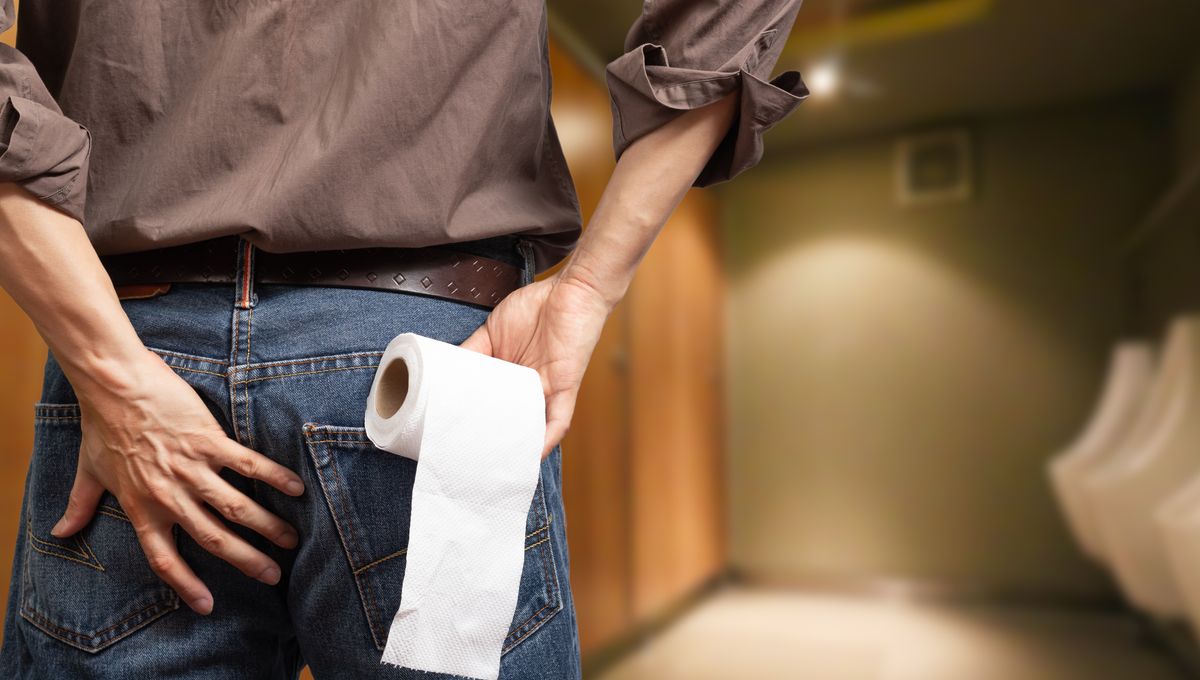
We humans tend to view pooping as a solitary activity. Unlike many animals, who void themselves without so much as breaking stride and use their waste in ingenious ways, most people would prefer not to discuss or even think about the topic when we’re not actually doing it. But when you’ve got to go, you’ve got to go, and sometimes that means in a public bathroom or in the workplace. For some, the very thought of that will send their sphincter clenching – and if that’s you, you could be experiencing parcopresis.
No one loves talking about this stuff and it’s easy to make a joke of it, but parcopresis is no laughing matter. As explained in a 2019 article in the Australian Journal of General Practice, it is a psychogenic condition that leads to difficulty or inability to defecate in public. It’s sometimes referred to as “shy bowels”.
People with this condition may find it impossible to poop anywhere other than their own bathroom at home. In a case detailed in a 2011 report, the patient required his own family to leave the house so that he could use the toilet. Others have reported particular issues when sharing hotel bathrooms, for example, and the office loo may be out of the question altogether.
Parcopresis can come under the broader umbrella term of “toilet phobia”. This can also encompass paruresis, or shy bladder, as well as other general fears around using the bathroom. There may also be a crossover with forms of obsessive-compulsive disorder (OCD) that center around fear of contamination, especially in public bathrooms that may not be as clean as we would like.
The prevalence of parcopresis is not well understood. Lots of people with anxiety disorders and phobias fear the stigma that can surround these conditions and thus choose not to be open about their difficulties. Add to that the fact that in many cultures it’s considered impolite or embarrassing to discuss one’s toilet habits, and you can quickly see how many people with parcopresis may not be receiving any help or support.
With parcopresis specifically, the anxiety can stem from a range of factors, such as a fear of being overheard, or being judged by others because of smells in the bathroom, or the length of time you spend in there. For some people, the phobia may be connected to an experience in their childhood or have been brought on after a diagnosis of a bowel condition.
As well as the unpleasant symptoms that can accompany any form of anxiety, and the social and emotional problems sufferers can face, there are also health risks associated with holding in your poop too often. Chronic constipation, hemorrhoids, fecal incontinence – these are all things best avoided if possible.
Of course, there are some situations where you just can’t hold it. Urgency is a common symptom of lots of bowel conditions, like irritable bowel syndrome and inflammatory bowel disease. When parcopresis is added to the mix as well, it can even prevent people leaving the home, causing huge disruption to their work and social lives.
A 2021 study investigated parcopresis in a group of over 700 university students. As author Simon R. Knowles wrote for The Conversation, “It’s not necessarily easy or appropriate to follow people around to track whether they use or avoid public toilets”. Instead, Knowles presented the students with a series of hypothetical mall bathrooms with different configurations of stalls and occupancy rates.
“The rate of avoidance was just over 14 percent overall,” Knowles found. “Around 10 percent avoided going when all toilets were available. This rose to around 25 percent when only the middle of three toilets was available.”
“It’s Okay To Poo At Work”
Much as we might like to pretend otherwise, it’s a simple fact that we all poop. Your favorite celebrity? They poop. Royalty? They poop. Astronauts in space? They have to pass a test first but yeah, they poop too.
To try to help us all feel a little better about this essential bodily function, the Queensland Health department in Australia recently launched a campaign with a simple and important message (and some of the best graphics we’ve seen since 1997): It’s Okay To Poo At Work.
While recognizing the very real stress that can come with pooping in public, the campaign offers some helpful tips to make the experience a little easier, such as using a fragranced bathroom spray or doing some deep breathing exercises.
There’s also a reminder that if you’re concerned that parcopresis is affecting your life, there is help available, so please contact your healthcare provider.
Being less squeamish about needing to go number two is not only good for our own bowel health – it can also help relieve some of the stigma that is still attached to medical conditions affecting the gut, and can open up conversations about changes in bowel habits that may even be lifesaving.
All together now: “It’s okay to poo at work!”
Source Link: If You Find Using Public Bathrooms Tricky, You Could Have Parcopresis